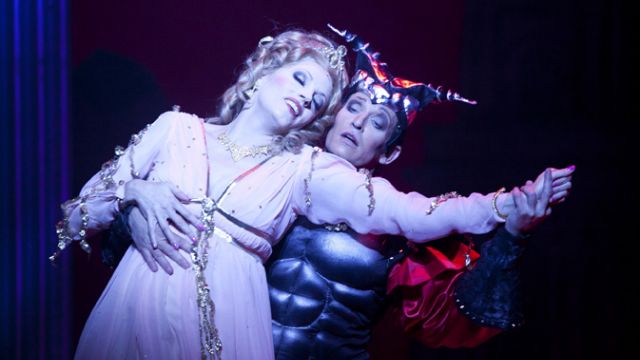Orpheus in the Underworld
“Life’s a bore without amour” agreed – and in the present political climate, a bit depressing too. Thanks be, therefore, that Opera Australia brought Jonathan Biggins and Phil Scott in to rework their 2003 adaptation of Orpheus. It’s bright, fast, funny, colourful and very topical. Without losing the Arcadian imagery of its original setting, or detracting from Offenbach’s beautiful music, this production brings the political and social satire up to date with Biggins’ and Scott’s usual clever lyrics and the compulsory rhyming couplets.
In this, Offenbach’s first Opera Bouffon, the librettists, Ludovic Halevy created the verses for the arias and ensembles, and Hector Cremiuex the dialogue.
Set in Ancient Greece, yet depicting the questionable behavior of the French middle class, the satire of the operetta was acclaimed in France and across Europe. Today it still provides the opportunity to mock and satirise, but why?
 Perhaps the answer lies first in the music. The phrasing and the tempo allow for quirky lyrics, rousing chorus reprises, a little bit of ballet and of course, the ‘Galop Infernal’, better known as the can-can. The music is at once lyrical and foot tapping, everything one expects of comic opera, and even a little bit more.
Perhaps the answer lies first in the music. The phrasing and the tempo allow for quirky lyrics, rousing chorus reprises, a little bit of ballet and of course, the ‘Galop Infernal’, better known as the can-can. The music is at once lyrical and foot tapping, everything one expects of comic opera, and even a little bit more.
Then there is the setting. Removing the characters, and therefore the criticism, to a different time and place worked for the Greeks and for Shakespeare. It worked for Offenbach, for Gilbert and Sullivan, Brecht and Weil. It softens the blow a little, but the effect of the punch is still there.
Whether it is Eurydice and Orpheus, mere Theban mortals, and the Gods of Olympus – or present day politicians and bureaucrats – hypocrisy abounds, and with it the opportunity to satirise. And if Public Opinion still monitors all, who better to choose to represent Public Opinion today, than some of the reporters of the Press.
Performed here by Suzanne Johnson, Public Opinion towered on a high moving plinth in her second scene, censoriously admonishing those below.
 Enough background! What about the production? Todd McKenney, resplendent in patent leather and studs and silver heeled boots struts his stuff as Pluto, high kicking the can-can. Christopher Hillier is the white-bearded, lecherous Jupiter, Victoria Lambourn his whining wife, Juno. Andrew Brunsden, with a high, feathery blonde Mohawk and gold costume and violin is a reluctantly repentant Orpheus and Rachel Durkin a sexily, tempting Eurydice. Mitchell Butel, in green make up, is a very popular John Styx. In fact, the whole cast is wonderful, as are the costumes and the effects.
Enough background! What about the production? Todd McKenney, resplendent in patent leather and studs and silver heeled boots struts his stuff as Pluto, high kicking the can-can. Christopher Hillier is the white-bearded, lecherous Jupiter, Victoria Lambourn his whining wife, Juno. Andrew Brunsden, with a high, feathery blonde Mohawk and gold costume and violin is a reluctantly repentant Orpheus and Rachel Durkin a sexily, tempting Eurydice. Mitchell Butel, in green make up, is a very popular John Styx. In fact, the whole cast is wonderful, as are the costumes and the effects.
There are some wonderful stage images. McKenney’s transformation from Aristaeus to Pluto; Eurydice’s bubble bath; Mercury’s arrival on a flying bicycle; Jupiter’s ‘buzzing’ song with Eurydice; the ‘Galop Infernal’; Mars in all his very rotund and fierce glory; Venus, Cupid, Diana and the character costumes of the chorus …
It’s nice to be able to laugh so much in the opera theatre. It doesn’t happen that often – and that’s as it should be – but, just as was obviously the case in Offenbach’s Paris, there are times when we need a little comic relief, and if that can be mixed with great music and clever writing and direction, in the words of the Prime Minister … “bring it on”!
Carol Wimmer
Images (from top): Rachelle Durkin as Eurydice & Todd McKenney as Pluto, Mitchell Butel as John Styx & Rachelle Durkin as Eurydice, and Todd McKenney as Pluto & Mitchell Butel as John Styx. Photographer: Lisa Tomasetti.
Subscribe to our E-Newsletter, buy our latest print edition or find a Performing Arts book at Book Nook.

